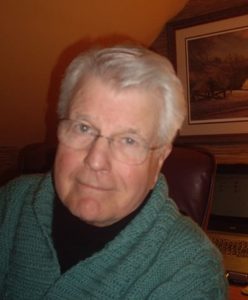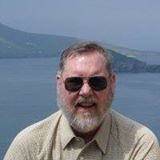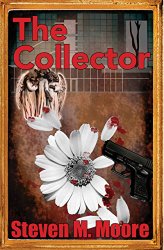Mystery and Science Fiction Author Steven M. Moore, An Interview Part I
Mystery and science fiction author Steven M. Moore is featured in this post. Last month, I published a review of Steve’s The Collector on this web site as well as on Amazon and Goodreads. Steve and I have been trading thoughts on writing, reading, politics and life itself for the past few years. After I posted his review, I asked him to consider working with me on an interview. I am glad he agreed. What follows is the first of two installments.
You are a prolific writer with 15 novels, inlcuding several mystery novels, and 2 anthologies to your credit. What got you started writing in the first place?
I always wanted to be a writer. I started out making my own comic books as a three- to four-year-old kid (Mom taught me to read before kindergarten) and wrote my first novel the summer I turned thirteen (chucked into the circular file when I cleaned up my room leaving for college). My father, a wannabe artist, showed me that art (writing is an art) probably wouldn’t support a family, so I became a scientist, back then an easy thing to do because of all the funding available as a paranoid reaction to Sputnik. At the end of my scientific career, I decided to return to my first love.
Do you have a favorite among the many that you have written? Why is it a favorite?
It depends on the day you ask me, I suppose, but generally speaking, it’s my last book. I write genre fiction because that’s what I enjoy reading most. There’s something about wowing readers with an entertaining yarn—maybe wandering Irish storytellers in my past? Right now I just finished the sequel to Muddlin’ Through, so that’s my favorite tale now, but you’ll have to wait to read that one.
How much research goes into your novels? The Collector, for example, goes into the history of Nazi Germany? Did that require any special study?
Detective Castilblanco is a bit of a history buff. That plays an important role in Aristocrats and Assassins, the previous book in the “Detectives Chen and Castilblanco Series.” In The Collector, the historical stuff is handled more by the dowager from Scotland Yard, the London expert in recovering stolen art (and my bow to Miss Marple). By the way, she’s trying to convince me to write a mystery novel featuring her as main protagonist.
To answer your question, though, I have a lifetime of experiences behind me, so sometimes I don’t have to do much research (e.g. having lived in the Boston area, I was quite familiar with the Isabel Stuart Gardner Museum heist that’s figured in The Collector); other times, like the genetics material in Full Medical and No Amber Waves of Grain, first and third books of the “Clones and Mutants Series,” I spent more time doing the research than writing the novels. It isn’t really research in the scientific sense, of course, but just tracking down what’s already known.
Your novels contain frequent allusions to world affairs. This is true of your blog postings also. What inspires your interest in this area?
When I started my website, the CEO of my website design firm said that I should have a blog. I looked around at other sites and decided another blog about the writing business might be superfluous. Although I have posts about writing, even those are basically op-ed. I’m a political animal and have strong opinions about things. So, why not op-ed? Because it’s a blog, I can pretty much say what I want. If people don’t like it (people have a right to their own opinions!), they can comment on the post. You’ll see some unusual comments sometimes, but I tend to accept them all if they’re civilized and basically free of strong, offensive language.
For my books, and short stories, for that matter, there’s often an underlying theme about issues some people often prefer to ignore, like sex trafficking in The Collector, something I abhor more than my character Castilblanco. That often goes hand-in-hand with exploitation of immigrants, especially women and children. Terrorism is another common theme. I realize that issues are often gray and not black or white, but events like the recent slaughter of one hundred-plus school children in Pakistan and Sandy Hook are unconscionable. The “Detectives Chen and Castilblanco Series” has oscillated between mysteries and thrillers, and the latter often treat some aspect of terrorism.
Tells us about your academic background?
I tend to minimize it. No one likes a snobbish erudite. I needed math and science degrees—union cards, if you will—to make a living as a scientist. I always found those subjects easy, not as easy as spinning a good yarn, but easy enough that I could go a step beyond my parents’ standard of living to one that was more comfortable. Degrees are over-rated. I don’t think the inventor of the laser had a PhD. Bill Gates and Steve Jobs certainly didn’t (well, maybe honorary ones). The only people I call Doctor are my physicians.
That said, my “first career” was research and teaching. I loved to work with young, bright minds, and still do, and I carried this love into my second career in scientific R&D work. Even now, as a full-time writer, I love to work with young writers. I was active in the now defunct Edit Red, for example. I wish I had more time to do it, but the best I can do now is to review books and offer interviews to aspiring authors—those probably don’t do much good in this competitive environment, but it’s giving something back to the reading and writing community, and future generations.
You pay attention to the national origin of your characters. Why is that?
We overblow political correctness in the U.S. to the point where we’re supposed to be ethnically blind as well as race- and religion-blind. I trend in the other direction—I celebrate diversity. I lived in Colombia for many years. In academics, I worked with people from all over, including many smart women. With the international makeup of our department in Colombia, for example, I learned first-hand the difference between Bavarians and Prussians. Science is done by human beings, and their diversity adds to, not subtracts from, scientific activity. Besides, I like ethnic foods. One fond memory is eating in an Indonesian restaurant…in Amsterdam!
One of my writing heroes is N. Scott Momaday, my English prof at UCSB. I celebrate that he’s a Native American who won a Pulitzer. Why not? My character Castilblanco is a Puerto Rican who rose out of poverty and became a force for good, but he recognized the limitations of Catholicism and became a Buddhist. Ethnic, racial, and religious diversity make this country and world great and should be celebrated. The U.S.’s handling of that diversity is an iconic symbol for the rest of the world for the most part. I celebrate that too.
I grew up in California. My parents’ closest friends were Armenian, how I learned about the Armenian holocaust. My father’s sales route included many grocery stores run by Chinese and Japanese. During World War II, he loathed the Japanese internment camps. My mother’s church work included helping farm laborers. Although my father was of Irish descent and my mother of German, they loved all ethnic food, and passed that predilection on to my brother and me.
My first college was UC Santa Barbara, where the main drag was Embarcadero del Norte and the visiting professor next door was a Chilean artist. My first steady girlfriend was Lithuanian; my first wife was Colombian; and my two kids spoke Spanish before they learned English. I traveled a lot in Europe as an ambassador for Colombian science. Bottom line: my interest in the world’s diverse peoples and cultures comes from a lifetime of experiences. That’s reflected in my books.
Were you encouraged to write as a boy? By whom?
My mother. She thought it was cute that I was trying to make my own comic books. I don’t know about the cuteness—it’s mostly overrated, e.g., the baby royal. I’ve always been self-motivated, maybe a wee bit egotistical: “I can do better than that!” Reading came first, though; any writer who isn’t an avid reader can’t be a good writer. Touch typing (a formal course) and speed reading (an informal, voluntary course) were my most useful courses in high school. They have served me well, but the speed reading allows me to plow through books, which is why I often read them twice for reviews, just in case I’ve missed something.
Who are your favorite authors?
The list is too long. I was recently reminded why my detective stories are “hard-boiled,” because I read such stories as a kid. Chandler comes to mind. I also read a lot of sci-fi—hard sci-fi, not fantasy. Those were the days when we were taught to hide under our student desks in case of atomic attack, something I thought stupid and would express my opinions on, so dystopian sci-fi was especially appealing to me. Kornbluth and several British authors like Christopher come to mind. Of course, there’s Asimov, whose sci-fi novels Caves of Steel and The Naked Sun are sci-fi mysteries—I like to combine genres too. Just a few years ago, I discovered Ian Rankin, but I’ve discovered many interesting authors in my capacity as a reviewer, too. There are so many good books and good authors now.
And so ends Part I of my interview with Steven M. Moore. Part II follows in a few days. Watch for it.
Thanks for visiting my web site. I invite you to look through the other pages while you are here and I would welcome any comments you care to make in the area provided below or on the “Contact” page, the last on the directory list at the left.



